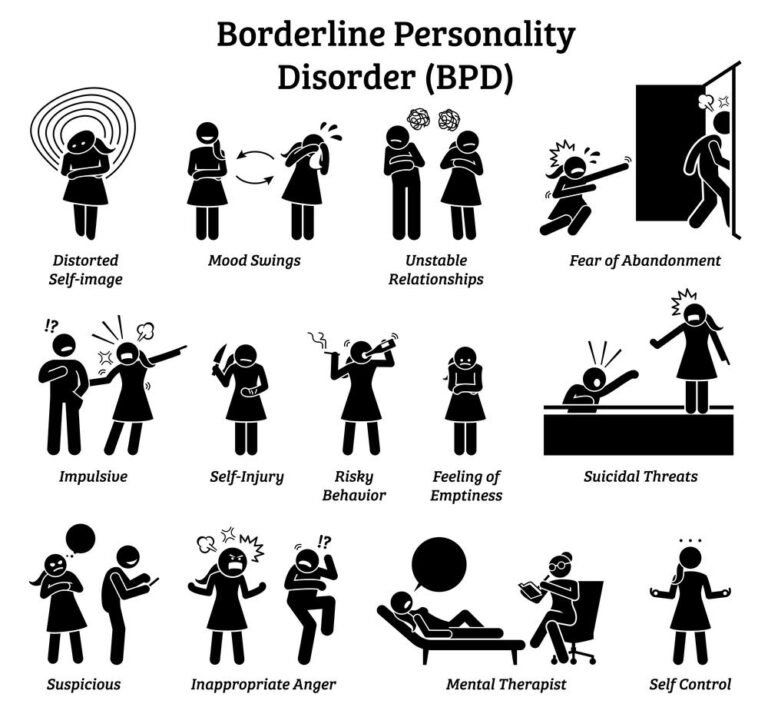Confidence is often celebrated as a key ingredient for success—a trait that fuels ambition, fosters resilience, and opens doors to new opportunities. However, there’s a fine line between healthy self-assurance and a level of confidence that can tip into something far more complex and potentially troubling: personality disorder. In this article, we’ll explore how high confidence, when unchecked or extreme, can manifest as traits seen in certain personality disorders. Understanding this boundary not only helps in recognizing when confidence becomes problematic but also sheds light on the importance of self-awareness and balance in our personal and professional lives.
Table of Contents
- Understanding the Fine Line Between Confidence and Narcissistic Traits
- Identifying When Self-Assurance Becomes Maladaptive Behavior
- The Psychological Impact of Excessive Confidence on Relationships
- Strategies for Balancing Healthy Confidence with Emotional Awareness
- Future Outlook
Understanding the Fine Line Between Confidence and Narcissistic Traits
Confidence is a fundamental trait that propels individuals forward, empowering them to take risks, embrace challenges, and inspire those around them. It is rooted in a healthy self-awareness and respect for others, allowing for personal growth and meaningful connections. However, when confidence morphs into an inflated sense of self-importance and entitlement, it begins to tread into unhealthy territory. The distinction lies in the balance between self-assurance and empathy:
- Confident individuals acknowledge their strengths while remaining open to feedback and learning.
- They exhibit humility and validate the contributions of others without feeling threatened.
- Narcissistic traits, in contrast, prioritize self-aggrandizement and demand admiration, often at the expense of authentic relationships.
- Such traits include a lack of empathy, manipulative behaviors, and an unshakable need for control or superiority.
Recognizing the subtle cues that differentiate a healthy sense of confidence from narcissistic tendencies is vital for both personal well-being and interpersonal dynamics. Those exhibiting narcissistic patterns may struggle with vulnerability and are often resistant to change, creating barriers in both personal and professional spheres. Cultivating true confidence involves embracing imperfection and fostering genuine connections, rather than masking insecurities through dominance or grandiosity.
Identifying When Self-Assurance Becomes Maladaptive Behavior
Confidence is undeniably a vital trait that empowers individuals to take risks, pursue goals, and navigate social interactions with ease. However, when this self-assurance shifts from healthy to excessive, it can evolve into patterns of behavior that hinder personal growth and relationships. The key difference lies in flexibility versus rigidity. Adaptive self-confidence allows room for feedback, learning, and adjustment, whereas maladaptive behavior often involves an unyielding belief in one’s superiority or correctness, regardless of evidence to the contrary.
Signs that high self-assurance has crossed into detrimental territory include:
- Persistent dismissal of others’ opinions, which can alienate friends, family, and colleagues.
- Inability to accept failure or criticism, often resulting in defensiveness or denial rather than reflection.
- Exhibiting arrogance or entitlement that undermines empathy and creates barriers in communication.
- Compulsive need to dominate conversations or decision-making, indicating an overinflated sense of self-importance.
These behaviors can signal underlying issues such as narcissistic traits or other personality disorders where confidence is less about inner strength and more about masking insecurity or maintaining control. Recognizing this shift is crucial for seeking appropriate support and fostering healthier interpersonal dynamics.
The Psychological Impact of Excessive Confidence on Relationships
Excessive confidence, while often mistaken for strength, can insidiously erode the foundation of healthy relationships. When self-assuredness tips into arrogance or entitlement, it can create an environment where empathy and mutual respect are stifled. Partners and friends may feel unheard or undervalued, leading to emotional distancing and resentment. This overconfidence frequently manifests in a refusal to acknowledge others’ perspectives, fostering power imbalances that hinder genuine connection and collaboration.
The psychological toll extends beyond interpersonal dynamics. Individuals exhibiting this behavior might unknowingly struggle with vulnerabilities hidden beneath the surface of their bravado. Common consequences include:
- Heightened interpersonal conflict due to a lack of self-awareness.
- Difficulty forming authentic bonds stemming from constant defensive posturing.
- Emotional isolation as others withdraw from one-sided relationships.
- Potential escalation into personality disorders when unchecked, complicating mental health and social functioning.
Recognizing these patterns early allows for intervention, fostering balanced confidence rooted in humility and respect—key ingredients for thriving, resilient relationships.
Strategies for Balancing Healthy Confidence with Emotional Awareness
Cultivating healthy confidence requires more than just self-assurance—it demands a conscious effort to stay emotionally grounded. One effective approach is the regular practice of self-reflection. Taking moments throughout the day to check in with your feelings can help you distinguish between genuine confidence and defensive arrogance. Incorporating mindfulness techniques, such as mindful breathing or journaling, encourages emotional clarity. This not only tempers overconfidence but also increases empathy, allowing you to connect authentically with others without overshadowing them.
Additionally, building a network of honest feedback is crucial. Surround yourself with trusted individuals who can offer constructive criticism without judgment. By actively listening to perspectives outside your own, you widen your emotional awareness and avoid slipping into self-centered narratives. Remember to balance assertiveness with humility by:
- Recognizing your strengths while admitting limitations
- Celebrating achievements without dismissing others’ contributions
- Responding thoughtfully rather than reacting defensively
Through these strategies, confidence evolves into a dynamic force—one that empowers without alienating, and enlightens without blinding.
Future Outlook
In the journey of self-discovery and personal growth, confidence is undeniably a powerful asset. However, as we’ve explored, when high confidence tips into the realm of personality disorder, it can become a barrier rather than a booster — affecting relationships, decision-making, and overall well-being. Recognizing the fine line between healthy self-assurance and problematic behavior is crucial, not only for individuals but also for the people around them. If you or someone you know is struggling with these challenges, seeking professional guidance can make all the difference. After all, true confidence is rooted in self-awareness, balance, and respect — foundations that support lasting success and meaningful connections.

